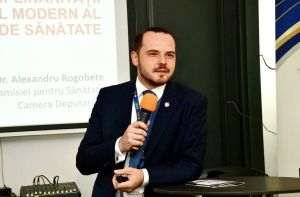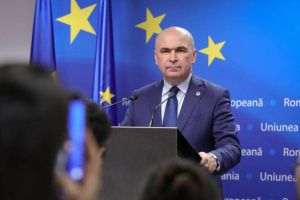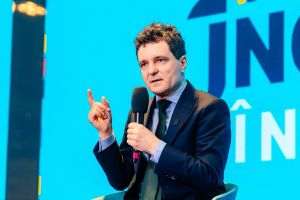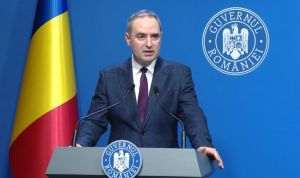Ideea comasării alegerilor europarlamentare cu cele locale este una care poate aduce o prezenţă mai mare la vot, a declarat preşedintele PNL, Nicolae Ciucă, relatează Agerpres.
El a fost întrebat, într-o emisiune TV transmisă sâmbătă dacă PNL susţine comasarea alegerilor europarlamentare cu cele locale.
"Susţinem orice decizie, orice soluţie care să faciliteze faptul că avem un an cât se poate de complicat cu patru, putem spune chiar cinci runde de alegeri. Şi atunci, dacă ne uităm, din iunie până în decembrie, cu toţii vom fi ocupaţi şi preocupaţi de ceea ce se va întâmpla pe scena politică. Pentru că este o bătălie în urma căreia cel care va câştiga ia totul, iar ceilalţi trebuie să o ia de la început, ceea ce este foarte corect. Şi atunci nu cred că ne putem permite în contextul actual să sacrificăm o jumătate de an doar pentru un astfel de plan care se derulează pe cele şase luni", a declarat Nicolae Ciucă.
El a precizat că varianta comasării alegerilor trebuie susţinută şi constituţional.
"Şi dacă există posibilitatea constituţională, legală, care să vină în sprijinul democraţiei, pentru că până la urmă ce ne interesează? La alegeri să vină cât mai mulţi oameni, să putem să avem o legitimare a celor care sunt aleşi. Şi nu cred că cetăţenii - românii - vor fi atât de disponibili să participe la cinci runde de alegeri cu acelaşi entuziasm, dorindu-şi să îşi manifeste dreptul la vot. Ca atare, ideea comasării este o idee care poate să ne aducă o prezenţă mai mare la vot", a declarat Ciucă.
Acesta a pus în discuţie şi afectarea derulării procesului de învăţământ, în cazul în care alegerile nu ar fi comasate, având în vedere că secţiile de votare sunt amenajate în şcoli.
"De asemenea, ştim cu toţii că secţiile de votare sunt organizate, unde în altă parte decât în şcoli. Şi atunci va fi un impediment şi în ceea ce priveşte derularea normală a anului de învăţământ, fie că vorbim de finalul anului 2023-2024 începutul anului de învăţământ 2024-2025, şi dacă nu mă înşel, sunt aproape 10 săptămâni care ar putea să fie afectate de desfăşurarea procesului electoral. Ca atare, o soluţie în acest sens cred că este binevenită", a explicat Nicolae Ciucă.
Liderul PNL a opinat că deciziile în plan normativ privind o comasare a alegerilor ar fi în sarcina Guvernului, dacă nu se intervine în elementele principale ale cadrului legislativ privind desfăşurarea alegerilor.
"Aşa cum arată lucrurile acum, din punct de vedere constituţional, dacă nu se intervine în elementele principale ale cadrului legislativ privind desfăşurarea alegerilor, ci doar la elemente care ţin de temporalitatea procesului, de timpii în care se desfăşoară, atunci este o responsabilitate a Guvernului pentru a emite o hotărâre de guvern în care să se stabilească foarte clar calendarul alegerilor. Nu doar comasarea. Şi sunt nişte condiţionalizări de timp, 90 de zile, 75 de zile, să avem aceste hotărâri", a afirmat Ciucă.
El a fost întrebat şi care este stadiul discuţiilor purtate în cadrul coaliţiei cu preşedintele PSD, Marcel Ciolacu, pe subiectul comasării.
"Am discutat şi am convenit ca fiecare dintre noi să mergem în forurile de conducere ale partidelor, să obţinem mandat pentru a discuta despre această formă de comasare şi după aceea să revenim la forul de conducere, respectiv la Biroul Politic Naţional, să consultăm liderii partidului şi ulterior să prezentăm decizia noastră", a precizat Ciucă.
El a vorbit şi cu privire la acuzele opoziţiei, potrivit cărora comasarea nu este o decizie democratică, întrebat dacă se va ţine cont de recomandările venite de la Comisia Europeană şi de la Comisia de la Veneţia.
"Dacă ne uităm în istoria alegerilor europarlamentare nu este pentru prima dată când s-ar desfăşura alegeri europarlamentare laolaltă cu alegeri locale. S-au desfăşurat şi în celelalte ţări europene. În momentul de faţă ştim deja că sunt decizii luate în patru ţări şi vorbim de Germania, Italia, Belgia şi Irlanda. Şi mai sunt încă trei sau patru ţări care se gândesc, de asemenea, să realizeze această comasare. De unde rezultă că nu este o practică pe care o impune România. Ea a fost folosită, se foloseşte", a afirmat Ciucă.
















































1. fără titlu
(mesaj trimis de anonim în data de 03.02.2024, 14:19)
Exact!
Ca sa avem o speranta... in scos oameni din case... ca pentru "Catu" sau ala cu "Sa luati credite x3 subventia in agricultura"... si acum agricultura pe butuci... nu iesea nimeni
s c c r e t
2. fără titlu
(mesaj trimis de anonim în data de 03.02.2024, 14:39)
E ca si facuta treaba . Mai ramine de nominalizat candidat unic la prezidentiale si a-ti rezolvat opozitia filo budapesteana in frunte cu UDMR ce doreste sa se alieze spre ai oferi lui Simion presedintia .
3. fără titlu
(mesaj trimis de anonim în data de 03.02.2024, 15:03)
normal e simplu, dc vrei o participare cat mai mare la vot pui toate voturile in aceeasi zi, sau 2 zile hai sa nu fie cozi. dar altfel, sa duci oamenii de 3 ori la coada la vot, mai ales diaspora e mai greu. dar poate unora le convine prezenta mai mica
3.1. fără titlu (răspuns la opinia nr. 3)
(mesaj trimis de anonim în data de 03.02.2024, 15:43)
intotdeauna unora lea convenit prezenta la vot mai mica..cand a fost in avantajul lor....azi se pare... ca ei sunt cei incoltiti... le este frica de ce urmeaza....
s c c r e t
4. fără titlu
(mesaj trimis de anonim în data de 03.02.2024, 15:45)
La vot ar trebuii sa iesim toti cu Masca pe Bot! in semn de Solidaritate cu ei!
Altii sa iasa cu dosarele de creditare de x3 subventia si cu stocurile de "legune" nevandute...
Altii sa iasa cu scadentarele la plata credite...balonate la sf petru... scuze nu sf petru la cartel financiar... ca nu ii mai satura si pe astia hotia...
s c c r e t
5. fără titlu
(mesaj trimis de anonim în data de 04.02.2024, 02:05)
Boicot vot, nu aveți legitimitate, nu reprezentați pe nimeni, sunteți o gașcă de trădători.
6. fără titlu
(mesaj trimis de anonim în data de 04.02.2024, 06:52)
Va câștiga AUR .
7. fără titlu
(mesaj trimis de anonim în data de 04.02.2024, 07:42)
De ce sa mai votezi cand toti candidatii sunt niste impotenti politic?
7.1. fără titlu (răspuns la opinia nr. 7)
(mesaj trimis de anonim în data de 04.02.2024, 12:11)
TE duci si alege ce ti se pare raul cel mai mic. nu vei vedea candidati oameni de calitate niciodata in politica. cine se respecta, are succes, nu e hot, are experienta , scoala buna, si e si cunoscut, adica un om de calitate, nu se baga in politica, pt ca de ce ai vrea sa te injure toti nespalatii ca nu le convine nu stiu ce(pt ca normal, n-ai cum sa-i multumesti pe toti)
8. fără titlu
(mesaj trimis de anonim în data de 04.02.2024, 07:51)
S-a saturat lumea de voi.
Vor veni la vot și va vor praji!
La europarlamentare, și din cauza Schengen, vor dori sa schimbe toți mâncătorii de salariu europarlamentar degeaba, vezi Bușoi.
Va vom schimba!
9. structural peace should be priority
(mesaj trimis de anonim în data de 04.02.2024, 09:39)
Advancing Structural Peace: The Case for a Federalized European Union with Budgetary Integration
Introduction:
The discourse on the concepts of "structural peace" and a "United States of Europe equipped with a federal budget and treasury" resonates deeply within the ongoing narrative of European integration and the trajectory of the European Union (EU). This chapter delves into the intricate connection between these concepts, exploring their implications, goals, and the potential benefits that a more integrated EU could bring.
Structural Peace:
The term "structural peace" encapsulates the notion that robust and interconnected institutions, particularly in the context of a federal union, can be instrumental in fostering enduring peace and stability. A unified structure, underpinned by effective mechanisms for cooperation and economic interdependence, holds the potential to mitigate the risks of conflicts between member states.
European Union with Federal Budget and Treasury:
Envisioning a European Union equipped with a federal budget and treasury implies a significant centralization of financial resources and fiscal policy. This centralization is poised to foster a more balanced economic system, stimulating development and convergence across regions and member states. Simultaneously, it has the potential to fortify economic and political ties, thereby promoting stability within the EU.
Reducing the Risk of Intergovernmental Confrontation:
One of the primary advantages of establishing a common financial and fiscal system lies in the reduction of risks associated with intergovernmental confrontation. Member states, jointly sharing financial resources and responsibilities, develop a common interest in maintaining stability and avoiding conflicts, fostering a collaborative approach over divisive tendencies.
Promoting Common Interests:
The introduction of a federal budget and treasury could facilitate the efficient management of financial resources in support of shared EU goals. Investments in research, innovation, infrastructure, and regional development could be strategically directed, reinforcing economic and social cohesion within the EU.
Building a Unified Community:
The adoption of a federal structure has the potential to strengthen the sense of community and solidarity among member states. These close ties contribute to maintaining structural peace through enhanced cooperation and dialogue, as opposed to intergovernmental approaches that may exacerbate tensions.
In Conclusion: A Path Towards Consolidated Structural Peace:
In conclusion, the vision of a European Union with a federal budget and treasury emerges as a formidable force in consolidating structural peace. Through deeper integration, increased cohesion, and a commitment to shared values, this vision embodies a paradigm shift towards a more cooperative, stable, and resilient EU. The evolution towards such an integrated financial system signifies a profound dedication to the common objectives and ideals that underpin the very essence of the European Union.
10. Federalisation of Europe solution?
(mesaj trimis de anonim în data de 04.02.2024, 09:42)
The Interplay Between Globalization, Conflict, and the European Union's Integrated Vision
Continuing our exploration of globalization's intricate relationship with conflict, we n ow connect these discussions with the vision of a more integrated European Union (EU). This connection is critical as we navigate the complexities of economic regional integration and analyze the multilevel dynamics influencing conflicts on both international and intra-national stages.
1. What Happens
The dichotomy created by globalization, particularly through economic regional integration, finds resonance in the EU's journey towards integration. The European model of convergence, with its nuanced approach, serves as an instructive case study. By comparing the American and European models, we can draw parallels to the discursive tensions and conflicts arising fr om the EU's pursuit of economic convergence.
2. Why it is Happening
The dominance of neo-liberal economic strategies on the global stage parallels the challenges faced by state actors within the EU. As we delve into the causes of conflict, we connect the struggles of social democrats within the EU with the broader global narrative. The examination of legitimacy, structural, and functional conflicts becomes a lens through which we analyze the internal dynamics of the EU.
Connecting with the Previous Chapter
In examining the causes of conflict, the legitimacy conflict within the EU mirrors the paradox of identity and reflexivity discussed in the broader context of globalization. The EU's approach to identity and legitimacy serves as a microcosm of the global challenges faced in navigating conflicting values, interests, and worldviews.
3. How Can This be Judged:
The evaluation of globalization as an "engine" of social conflict extends to the EU's role in creating institutional, authority, and distribution crises. As we discuss the inadequacies of current global governance, the EU's own struggles with accommodating the contradictions between global capital and civilization come into focus. The call for a reevaluation of global governance resonates strongly in the context of the EU's evolving role on the international stage.
The EU's journey towards integration serves as a microcosm for the broader challenges discussed in evaluating globalization's impact on conflict. Bridging the gap between private and public sector logics, democratizing global governance, and redefining foreign policy structures become imperative not just for the EU but for the global community as a whole.
Conclusion:
In conclusion, the complexities of globalization, conflict, and the EU's integrated vision intertwine in a narrative that calls for a paradigm shift. As we navigate the interconnected world, the EU's experiences become a guiding light, emphasizing the need for normative politics, solidarity, and the virtues of "globalism" to bring unity in an evolving global landscape. The next chapter further explores the potential trajectories for a more integrated and harmonious future
11. fără titlu
(mesaj trimis de anonim în data de 04.02.2024, 09:46)
A Vision for United States of Europe with Integrated Financial Structures and Emphasis on Structural Peace
Introduction:
In envisioning the future of the European continent, the exploration of an integrated and secure United States of Europe becomes central. This comprehensive analysis will delve into the profound implications of an European Union equipped with a unified banking system, treasury, and a resolute commitment to structural peace. As we embark on this journey, the emphasis on human security will be a guiding principle, weaving through the interconnected threads of economic integration, structural peace, and the timeless ideals articulated in the Universal Declaration of Peace.
Chapter 1: A United States of Europe - A Vision for Human Security:
The foundational chapter centers on the concept of human security within the framework of a United States of Europe. By integrating financial structures through a Union Banking and Treasury, the EU can fortify its commitment to the well-being of its citizens. This chapter explores how such integration can create a safeguarding mechanism against economic vulnerabilities, fostering resilience and stability for individuals across the continent.
Chapter 2: Structural Peace in a Unified Europe:
Structural peace emerges as a linchpin in our exploration. The chapter delineates how a United States of Europe, with its integrated financial apparatus, contributes to the establishment and maintenance of structural peace. The interconnected nature of institutions within a federal union can substantially reduce the risks of conflicts, fostering an environment whe rethe well-being of citizens takes precedence over inter-state tensions.
Chapter 3: United States of Europe and the Common Declaration of Peace:
Delving into the universal principles that underpin peace, this chapter connects the vision of a United States of Europe with the ideals articulated in the Universal Declaration of Peace. By aligning its goals with this declaration, the EU can signify its commitment to peace, cooperation, and the well-being of humanity as a whole.
Chapter 4: Integrating Human Security into European Governance:
The concluding chapter synthesizes the discussed elements, emphasizing the pivotal role of human security in the envisioned United States of Europe. By integrating financial structures, fostering structural peace, and aligning with universal declarations of peace, the EU can establish itself as a beacon of stability, prosperity, and collective well-being.
Conclusion: A Harmonious Future Anchored in Human Security:
In conclusion, this comprehensive exploration ch arts a course for a future whe rehuman security stands at the forefront of European priorities. The vision of a United States of Europe, fortified by integrated financial structures, structural peace, and a commitment to universal ideals, paints a portrait of a continent that prioritizes the well-being and security of its diverse citizens. As we envision this harmonious future, the integration of these elements becomes imperative for shaping a United States of Europe that truly serves as a sanctuary for human prosperity and peace.